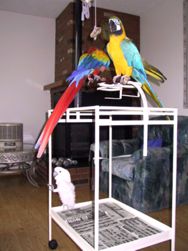
Parrots are pretty. Many acquire extensive vocabularies. Some learn tricks. The ideal pet, right?
WRONG
As a parrot owner of almost 20 years, and someone who has found homes for several unwanted birds during that time, I’ve learned that there’s much more to the story.
Watch the CBS report on discarded parrots.
Now before you head to the pet store, consider the following 10 points. While you read, bear in mind that keeping a parrot in a cage or dark room to prevent or mitigate its behavior is abuse. This practice can cause permanent, irreparable, psychological damage.
1. Parrots are not domesticated animals.
Parrots are essentially wild animals. They can be tamed, but they’re not domesticated like dogs or cats. They retain their wild instincts and behaviors.
2. Parrots are loud.
Parrots are flock animals; they communicate noisily and frequently with other members of the flock. Even happy parrots yell and screech. If they talk, they may practice favorite words endlessly. This is normal behavior.
3. Parrots bite.
They have large, powerful, sharp beaks. Bites can cause very serious damage. Parrots bite humans they love as well as those they hate. They bite for many reasons – and if you have a parrot, you’ll eventually be bitten.
4. Parrots are destructive.
Their beaks are powerful tools, and they keep them in top shape by chewing things. They don’t differentiate between toys and expensive furniture, clothing, eyeglasses, carpets, wires, etc. Chewing is normal behavior, and one day something important will be chewed.
5. Parrots are expensive.
Everything associated with parrots is expensive. Proper cages are pricey. Providing an ongoing supply of toys, which are quickly destroyed, is costly. Feeding a parrot is expensive, and much of the food is wasted. Regular vet visits will also stretch your budget.
6. Parrots are demanding.
Parrots are sentient, living, social beings. They need companionship and interaction. Because they must be kept in a cage for their safety, they are reliant on their caregivers for everything in their life. They can’t be ignored or put off until it’s convenient. Parrots are intelligent. They know when they’re being dismissed. They need your interest and time every day.
7. Parrots are time-consuming.
Cages must be thoroughly cleaned and checked for damage regularly, their water replaced several times a day, food checked and replaced daily, and fresh food provided twice daily. Toys must be rotated and replaced frequently.
You cannot leave parrots unsupervised for long periods. They foul their water and food; their cages become dirty and smelly, and unhygienic conditions result in illness. They can become caught in their toys and injure or kill themselves. Neglected and bored parrots become neurotic and self-destructive.
8. Parrots are hormonal.
Baby and juvenile parrots are cute and loveable. But baby parrots grow up. They must be properly handled and socialized while young, or unwanted and neurotic behaviors can develop. Parrots eventually become sexually mature; they want to find mates and build nests. They may become aggressive with their caregivers, or reject their caregivers in favor of somebody else.
Parrots are cavity nesters who build their nests in hollow trees. They’ll look for similar places in the home – such as cupboards or closets. They are very persistent and territorial, and can be unpleasant to live with. Females lay eggs even without a mate. This can lead to calcium deficiencies or serious conditions such as egg binding.
9. Parrots are messy.
They drop and throw their food when they eat. They slop water around when they bathe in their water bowl. They chew things up and toss the pieces everywhere. They strew feathers over everything, and the feathers that produce powder coat every available surface with dust. They’re not suitable pets for people with allergies or those who insist on an immaculate home.
Parrots poop everywhere, including in their water and food bowls – and on your favorite clothing. Although they can be trained to poop on command, they have to be allowed to poop very often or they can become sick (expensive vet visit) or die (no more expensive parrot).
10. Parrots are forever.
Parrots are long-lived. They will outlive you. They’re more than a lifetime commitment. Parrots are not commodities. They’re intelligent beings who form complex relationships. They suffer emotionally and psychologically from being moved from home to home.
If you wouldn’t sell your child because you no longer wanted it, or lock your child in a dark room and ignore it because it was loud, inconvenient, or no longer fun; if you can’t imagine being saddled with a 2-year-old child for over 50 years – then you don’t want a parrot.
Unwanted parrots are ignored, neglected, and eventually sold cheaply or given away. They suffer greatly.
Unconvinced?
Now that you’ve read all these reasons not to buy a parrot, if you’re still certain that having one is important to you, don’t go to a pet store. Millions of parrots in sanctuaries like Parrots Forever need caring, responsible homes.
You can also arrange a virtual adoption, where your financial support is targeted to the care of a permanent sanctuary parrot who cannot be rehomed because of medical, physical, emotional, or behavior issues.
Let’s all vow to be part of the solution, not part of the problem.
The Parrots Forever website contains an expanded version of these tips under the tab, “Ten Reasons”.
Written by Kathy Steinemann on behalf of Parrots Forever.
The Writer’s Lexicon series
and additional resources on my Facebook page.
Discover more from KathySteinemann.com: Free Resources for Writers
Subscribe to get the latest posts sent to your email.

Thanks for sharing this great article. Very interesting ideas! (as always, btw)
Thank you, Garofalo.